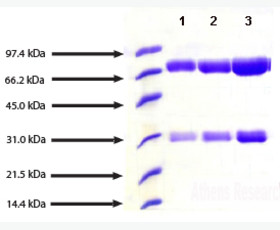Recombinant Human Brevican Core Protein/BCAN/BEHAB
| Product name: | Recombinant Human Brevican Core Protein/BCAN/BEHAB |
| Source: | Human Cells |
| Purity: | Greater than 95% as determined by reducing SDS-PAGE. |
| Buffer Formulation: | Lyophilized from a 0.2 μm filtered solution of 20mM PB,150mM NaCl,pH7.4. |
| Applications: | Applications:SDS-PAGE; WB; ELISA; IP. |
| Storage: | Avoid repeated freeze/thaw cycles. Store at 2-8 oC for one month. Aliquot and store at -80 oC for 12 months. |
| UOM: | 100ug/50ug/200ug/1mg/1g |
| Source | Human Cells |
| Description | Recombinant Human Brevican Core Protein is produced by our Mammalian expression system and the target gene encoding Asp23-Pro911 is expressed with a 6His tag at the C-terminus. |
| Names | Brevican Core Protein, Brain-Enriched Hyaluronan-Binding Protein, BEHAB, Chondroitin Sulfate Proteoglycan 7, BCAN, BEHAB, CSPG7 |
| Accession # | Q96GW7 |
| Formulation | Lyophilized from a 0.2 μm filtered solution of 20mM PB,150mM NaCl,pH7.4. |
| Shipping |
The product is shipped at ambient temperature. |
| Reconstitution |
Always centrifuge tubes before opening. Do not mix by vortex or pipetting. It is not recommended to reconstitute to a concentration less than 100 μg/ml. Dissolve the lyophilized protein in ddH2O. Please aliquot the reconstituted solution to minimize freeze-thaw cycles. |
| Storage |
Lyophilized protein should be stored at < -20°C, though stable at room temperature for 3 weeks. Reconstituted protein solution can be stored at 4-7°C for 2-7 days. Aliquots of reconstituted samples are stable at < -20°C for 3 months. |
| Purity |
Greater than 95% as determined by reducing SDS-PAGE. |
| Endotoxin | Less than 0.1 ng/µg (1 IEU/µg) as determined by LAL test. |
| Amino Acid Sequence |
DVLEGDSSEDRAFRVRIAGDAPLQGVLGGALTIPCHVHYLRPPPSRRAVLGSPRVKWTFLSRGRE AEVLVARGVRVKVNEAYRFRVALPAYPASLTDVSLALSELRPNDSGIYRCEVQHGIDDSSDAVEV KVKGVVFLYREGSARYAFSFSGAQEACARIGAHIATPEQLYAAYLGGYEQCDAGWLSDQTVRYPI QTPREACYGDMDGFPGVRNYGVVDPDDLYDVYCYAEDLNGELFLGDPPEKLTLEEARAYCQERGA EIATTGQLYAAWDGGLDHCSPGWLADGSVRYPIVTPSQRCGGGLPGVKTLFLFPNQTGFPNKHSR FNVYCFRDSAQPSAIPEASNPASNPASDGLEAIVTVTETLEELQLPQEATESESRGAIYSIPIME DGGGGSSTPEDPAEAPRTLLEFETQSMVPPTGFSEEEGKALEEEEKYEDEEEKEEEEEEEEVEDE ALWAWPSELSSPGPEASLPTEPAAQEKSLSQAPARAVLQPGASPLPDGESEASRPPRVHGPPTET LPTPRERNLASPSPSTLVEAREVGEATGGPELSGVPRGESEETGSSEGAPSLLPATRAPEGTREL EAPSEDNSGRTAPAGTSVQAQPVLPTDSASRGGVAVVPASGDCVPSPCHNGGTCLEEEEGVRCLC LPGYGGDLCDVGLRFCNPGWDAFQGACYKHFSTRRSWEEAETQCRMYGAHLASISTPEEQDFINN RYREYQWIGLNDRTIEGDFLWSDGVPLLYENWNPGQPDSYFLSGENCVVMVWHDQGQWSDVPCNY HLSYTCKMGLVSCGPPPELPLAQVFGRPRLRYEVDTVLRYRCREGLAQRNLPLIRCQENGRWEAP QISCVPRRPARALHPEEDPEGRQGRLLGRWKALLIPPSSPMPGPHHHHHH
|
| Background | Brevican Core Protein (BCAN) is a secreted protein that belongs to the aggrecan/versican proteoglycan family. BCAN contains one C-type lectin domain, one EGF-like domain, one Ig-like V-type domain, one Sushi (CCP/SCR) domain and two Link domains. BCAN may play a role in the terminally differentiating and the adult nervous system during postnatal development. BCAN could stabilize interactions between hyaluronan (HA) and brain proteoglycans. |














